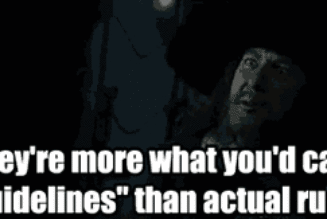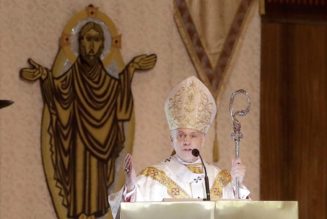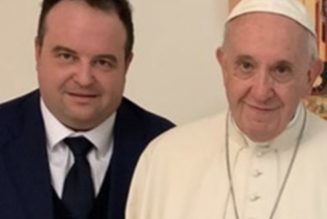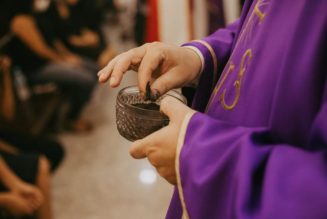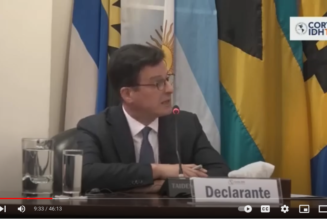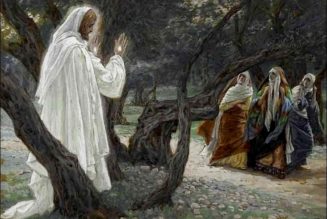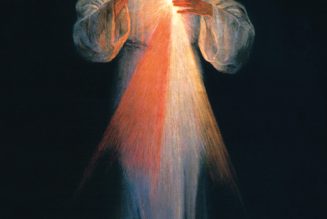Hey everybody,
Today is the feast of St. John Bosco, and you’re reading The Tuesday Pillar Post.
First things first — It’s Catholic Schools Week, and Ed and I are heading back to school, to make two live episodes of The Pillar Podcast, at the University of Dallas.
We’ll make that episode at 10 a.m. in the Gorman Faculty Lounge. It’ll be taped before a live studio audience. Presumably, there will be drinks then, too.

Here’s the deal. If you live in Dallas or its environs, you should come to one or both of these live shows. They’ll be fun and probably edifying, and if you want, you can come to the first one, then head to a local bar with us, and hang out until the second one the next morning. That’s how they do things in Texas, I’m told.
Also, our managing editor, Michelle La Rosa, is coming with us to Dallas; she’s an alumnus of the University of Dallas. She’s decidedly more interesting than us, and she’ll explain on the show why the University of Dallas celebrates Groundhog Day as its highest feast day of the year.
So really, you should come on Friday, or Saturday, or both. It’ll be great.
And as I mentioned, this is Catholic Schools Week. We’ll have some Catholic school coverage for you in the days to come.
For now, though, here’s what’s happening in the news.
The news
Pope Francis departed this morning on a trip to the Democratic Republic of Congo, and to South Sudan.
The pontiff was supposed to take this trip last year, but he couldn’t, because of his health. But he’s off now, and a lot of local Catholics have high hopes for the papal journey — in fact, in South Sudan, one priest organizer said recently that “when the pope touches the ground of South Sudan many miracles can happen.”
The situation is that both South Sudan and the DRC are countries plagued by very serious conflicts for decades, and some local Catholics in each place have hope that a papal visit will be the start of a new chapter, or will firm up the place of the Church in working for peace.
But will it? Are expectations too high? Can a papal visit really make a difference?
Journalist Filipe D’avillez has talked to a LOT of people in South Sudan and the DRC about the papal trip — he’s put together a sharp analysis on both what the pope’s trip to Africa might mean, and what people are expecting.
One missionary priest recalled a powerful 2019 moment, when Pope Francis knelt in the Vatican to kiss the feet of two rival warlord leaders visiting from South Sudan.
“Pope Francis left me stunned when he knelt to kiss their feet,” Fr. José Vieira recalled. “They were also clearly shocked with this prophetic and humble gesture of peace and reconciliation, to bend down and kiss the blood-stained feet of the warlords who have held the state hostage since 2005.”
But, the priest said:
“It had zero impact on the leaders. They continue to fight for their own economic interests, without a shred of concern for the victims.”
Will anything be different when Pope Francis lands in Africa? You’ll only read analysis like this at The Pillar. So read up.
—
Before he left for the DRC, Pope Francis made a long-expected decision to replace the prefect of the Vatican’s Dicastery for Bishops, Cardinal Marc Ouellet. The pope’s choice for the job is now-Archbishop Bob Prevost, a Chicago-born Augustinian priest who has spent much of his priesthood in Peru.
Prevost is a Chicago native, 67, a canon lawyer, with experience as a missionary, a diocesan administrator, and as head of the global Augustinian order. He is also a fluent speaker of Spanish. He seems, in short, to fit the mold of bishops most preferred by Pope Francis: experience in a religious institute, experience in missionary fields, some administrative experience, and, for the U.S., capacity to engage directly with the growing Hispanic Catholic population which is often identified as the future of the U.S. Church.
As it happens, The Pillar told you back in 2021 that Prevost was a Churchman with a big future, and was worth keeping an eye on – even while we didn’t predict he’d be a Vatican prefect.
In his new role, Prevost will make a big impact on the Church in the United States pretty quickly — 32 diocesan bishops in the U.S. are at least 73 years old. Bishops submit their retirement at 75, and 10 serving U.S. diocesan bishops are older than that. There is, in short, something of a backlog of American episcopal appointments, and Prevost will be the man now expected to fill the slots.
On that front, there’s already been some debate about what kind of men Prevost will look for as American diocesan bishops – especially because the new prefect is said to be closely aligned with Cardinal Blase Cupich, an outspoken critic of many of his brother American bishops.
There has been a lot of division among the U.S. bishops in recent years, and Cupich has been expected to augment his side of the divide by the episcopal appointments he’ll influence at the Dicastery for Bishops.
But it’s become difficult to find priests willing to become bishops, who have both the requisite background and the dispositions to do the job. As a result, it’s becoming increasingly clear that prefects can’t be choosers, which makes it harder to predict the kind of episcopal appointments the U.S. can expect for the next few years.
Of course, the Dicastery for Bishops does a lot more than the appointment of bishops – it oversees things like diocesan mergers, which are expected to become more commonplace in the secularizing West, and it oversees Vos estis lux mundi, the pope’s signature episcopal oversight policy.
Both those things are fraught with difficulty, and will feature prominently in ecclesiastical controversies in the years to come.
But whatever happens, Prevost has got work to do on the U.S. desk – among the bishops over 73 years old, 11 of them are metropolitan archbishops. There are, in short, a lot of appointments to be made in the next few years.
Read about the man who will oversee their appointment, Archbishop Bob Prevost, new prefect of the Dicastery for Bishops.
—
After a lot of fracas over a couple of years, the leadership of the Order of Malta met with Pope Francis Monday, as the order’s “Extraordinary General Chapter” came to a close.
The order has a long road of reform – and even reconciliation – ahead — and the members still need to elect a new grand master.
But knights told us that after a new constitution from the pope, there is a sense of genuine religious fraternity among the knights.
“There was a real sense that we are a religious order, gathered for a religious purpose, and not a political assembly or corporate board meeting,” one delegate to the meeting told The Pillar.
—
A report was published yesterday detailing a terrible pattern of abuse, over decades, on the part of L’Arche founder Jean Vanier, who died in 2019. Luke covered it in today’s Starting Seven.
Vanier was, before the abuse emerged, a personal hero of mine. I named my second son for him — though we have since changed his name to Daniel Casey.
—
Two Vatican leaders of the global synod on synodality process wrote to the world’s bishops yesterday, aiming to tell them that bishops have an important role to play in the global synod process — and to assure them that the synod meeting in Rome this year will focus on synodality, and not become a kind of free-for-all with a predetermined agenda.
Why did they need to write a letter like that? Well, because bishops have been concerned about those things. Will the letter assuage them? That remains to be seen.
Read what they said, and why, right here.
—
And since we’re talking about the synod on synodality, let’s talk about Cardinal Robert McElroy.
The cardinal, you might remember, published last week a controversial essay which seemed to call directly for changes to Catholic doctrine on the Eucharist and moral theology, and to entertain the possibility that the Church’s doctrine on ordination – taught definitively and by a formal act by John Paul II – might be open for debate and reconsideration during the synodal process.
You might recall that Ed wrote about this in his newsletter last week, and I wrote an analysis about the cardinal and the synod.
Ed and I, however, are not the only folks equipped to give analysis of the essay, and what it means, and I found myself wondering this past week about the genesis of the ideas in Cardinal McElroy’s essay, and the theological currents behind them.
So we asked theologian Larry Chapp to write a news analysis on the cardinal’s essay, focused on the theological underpinnings of what McElroy had to say.
You might know Chapp as a fiery commentator with a rhetorical flourish, and indeed, he is those things — and very good. Chapp is also a careful theologian, and in this analysis, we asked him to avoid the commentary of a column, in favor of a more systemic delineation of the theological questions raised by McElroy’s issue, and where they come from.
You can give it a read here. I am very glad to have Chapp doing this kind of work at The Pillar, and I look forward to him doing more.
But I also want to talk about Cardinal McElroy for a moment, kind of.
Chapp did a good job indicating places where McElroy’s theological perspective seems, or is, in tension with certain magisterially defined issues. Ed wrote that last week that the approach McElroy offers evokes the kind of “cheap grace” lamented by Dietrich Bonhoeffer. I want to talk about episcopal polarization and Church governance.
Look, there can really be no denying that the bishops of the West – the U.S. and Europe most especially – are divided among themselves over a number of key theological issues, and, indeed, over the baseline contours of their theological perspectives. In the past, I’ve framed that divide as a fundamental disagreement about the lens through which to read the Second Vatican Council, and through which to think about what the Church has to offer humanity.
Don’t believe me? Read this, the McElroy essay, and then read this incisive retort from Bishop Robert Barron. And lest you think that is just a battle of the Bobs – McElroy and Barron – be assured that other U.S. bishops are likely to issue their own responses in the coming days.
If you read The Pillar, you already know that we’re in a period of real and sincere division over big and important matters, and that the division seems to be getting sharper. Even while the USCCB has decided to take their debates to private session, they manage to spill out, because bishops feel, in conscience, obliged to offer their teaching on the life and mission of the Church. By the October meeting of the synod of bishops, I suspect, temperatures will be pretty hot on a lot of issues, which is why the Holy See is sending out missives trying to cool everybody down.
A lot of ink, money, and time is wasted in the Church right now on panels, Zoom sessions, or colloquia on “polarization” in the Church. There are a lot of people who seem to be asking why we can’t all just get along.
I am not among them. I think that there can be no true unity in the Church without truth as a foundation, because the Church is a confessional community. Here’s Ross Douthat’s take on that, if you’d like to read it.
In the history of the Church, truth is often clarified, crystallized, or recognized better through conflict — this is the ordinary mode of the Church’s doctrinal discernment, and things have been, at several times, much more strained than they are right now. Just read the history of the third century, or the fourth, or the fourteenth, etc.
The gist is this: Someone is wrong, and someone is right. Or, someone is partially right, and so is the other, and the discussion will eventually lead to a synthesis which gets at the heart of things. In either case, that’s got to be worked out, because the Church has a mandate to live and teach the truth. Because living and teaching the truth, as revealed by God and interpreted, taught, and guarded by the sacred magisterium, is God’s plan for human flourishing in this life, and salvation in the next.
This stuff matters.
So we needn’t be afraid of episcopal conflict over theological matters, even when it gets spicy, and we needn’t even be afraid of the kind of politicking that goes along with those things. It’s to be expected.
We also don’t have to be afraid that conflict among bishops will be a counter-witness to evangelization. Look, the evangelization of adults requires treating them like adults. Hiding disagreement is disingenuous and manipulative, and evangelization can’t be predicated on manipulation.
And the stuff I’m saying here isn’t complicated: “We profess that Jesus Christ came into the world, suffered, died, and was resurrected for us, and gave us the Church as the sacrament of our salvation and redemption. We think living in the truth matters a lot, and we argue about some of that, because we think it matters so much. But we also have a unity which exceeds the affective or superficial unity of ‘getting along,’ because we’re united in Jesus in the Eucharistic sacrifice, and that’s the most important thing in our lives — the source and summit of everything else. At the same time, there are people in the Church who really seem not to believe what she professes, and that’s a scandal — that’s, again, the reason we’re arguing so strenuously about this stuff.”
That’s a reasonable basis for evangelization, which adults who have existed in human communities can wrap their heads around.
But here’s what I am also concerned about, and I offer it as a word of genuine caution for the life of the Church — good governance. I care a great deal that the Church is led with justice, in truth, with respect for the dignity of the human person, and in accord with the dictates of divine, natural, and ecclesiastical law.
You should too. That also matters.
If we’re not careful, our theological disagreements can blind us to the importance of good governance, or encourage us to ignore its importance.
Here’s how it happens: Amid disagreement, people look for their allies. Those allies begin to support one another, and the mutual support morphs into a desire to see their arguments carry the day — to win.
That’s all fine and good, actually. That’s how theological disagreements work, and they end in either the clarity of synthesis, or the clarity of authoritative judgment.
But the people engaged in these debates are not robots, freed from ordinary human passions and temptations, and so mutual support often morphs into tribalism — “our side has to win, and theirs must be vanquished.”
Tribalism involves self-protection — “our side can’t admit weakness, lest their side gain the advantage.”
Self-protection is where bad governance loves to hide. Self-protection is where abuses of human dignity love to hide, and administrative negligence, or overall incompetence.
Tribalism is how McCarricks get protected — whether it’s ad intra tribalism of inter-Church conflict, or ad extra tribalism of “protect the reputation of the Church.”
That kind of thing is insidious, and inimical to the Gospel.
And as conflict intensifies – right now – and bishops find common cause among their brothers, self-protective tribalism will become a greater temptation.
When McCarrick emerged, and everybody was floored, and everybody was hurt, nearly everyone in the Church called for a full accounting of the truth.
But that call matters when the chips are down, and big, important disagreements are happening, and the McCarrick du jour is a member of your team. That’s when calls for more transparency, or more justice, or more accountability are actually tested. And right now, both bishops and practicing Catholics have to ask themselves if they think the truth – and justice – is worth the cost — even when it’s a cost to their team.
If we can’t answer that question, theological conflict and ensuing tribalism will become a refuge for manipulative wolves hiding in the sheepfold, speaking with all the right shibboleths, and waiting for sheep to snatch.
__
On Bosco
Again, today is the feast of St. John Bosco, a priest, educator, and catechist who was a gifted teacher and formator of young men. His ideas about Catholic education continue to influence Catholic schools around the world.

He is also the patron of editors, and I pray that he will intercede for us.
But I was disappointed to learn that St. John Bosco is not the namesake of America’s greatest chocolate syrup confection, Bosco Syrup. At least I don’t think he is. I did a pretty good amount of reading about this today, and it turns out there are a few differing accounts of how Bosco Syrup got its name.
Some people say that Bosco is named by the Italian word for “woods,” or “small forest.” Other people claim it comes from a Greek word for “to nourish.” It’s inconclusive.
But I’d like to think that St. John Bosco, who loved and understood children, intercedes for those of us who know the glory of Bosco syrup in milk.
Except — there is one thing. I learned this morning that Bosco syrup was once great because it added malt extract and vanilla to its cocoa powder recipe – giving a taste distinct from the inferior Hershey’s Syrup and Nestle Quik. But those ingredients got expensive, so Bosco reportedly revised its formula a few years ago, apparently becoming a saccharine imitation of its former glory.
Sic transit gloria mundi, my friends.
—
On Friday, Ed explained to you that after we published last week a story on laicized priest Frank Pavone, we lost a number of paying subscribers to The Pillar.
In response, many of you became paying subscribers yourselves, or increased your subscription level to The Pillar.
Thank you. Really. You’re making good journalism happen.
And if you meant to subscribe, increase your subscription level, or otherwise support The Pillar, you can, right now. We tell the stories that need to be told, and we do it because you make it happen:
And as to Pavone, some news outlets have corroborated The Pillar’s reporting since we broke the story, while other Catholic news outlets haven’t touched this story at all. Why? I don’t know.
But we ourselves continue to follow leads on this, and I expect we will probably publish follow-up reporting this week — but with news reporting, you can never be sure until you’re 100% sure that you’ve got the story, and we’re still working on securing our follow-up stuff.
In the meantime, thank you again – seriously – for supporting good journalism. You’re making a difference. And we appreciate it.
—
Finally, I read this morning the account of the MV Danio, a cargo ship which ran aground 10 years ago, in 2013, as it journeyed from Scotland to Belgium.
The ship ran aground because the captain was using a very cheap navigational system – little better than a car GPS – which more or less forgot that there are islands between Scotland and Belgium.
The captain forgot too, until his ship struck one of those islands at full speed, running aground on rocks just below the surface at high tide.
The ship ran aground pretty close to a lighthouse, actually, but the guy on watch was asleep, so that didn’t help.
The island was a nature reserve, full of puffins and seals. The ship couldn’t just be towed away — it eventually had to be sunk, repaired underwater, refloated, and then tugged away.
I don’t know what the lesson is, but it’s a hell of a story, and it made me laugh. You can see some pretty cool pictures of the Danio here.
—
Be assured of our prayers, and please pray for us, we need it.
Have a good week, and watch out for islands. And if you’re in Texas, come to our shows on Friday and Saturday. They’ll be great.
Sincerely yours in Christ,
JD Flynn
editor-in-chief
The Pillar


